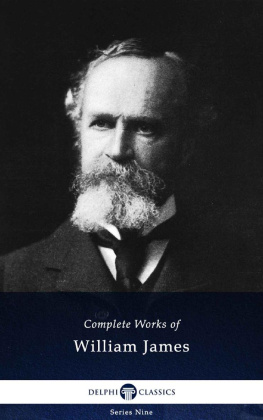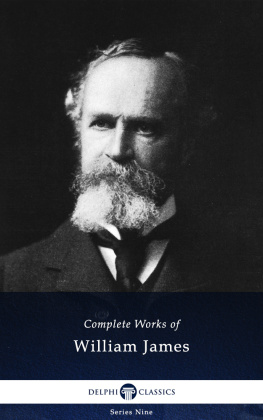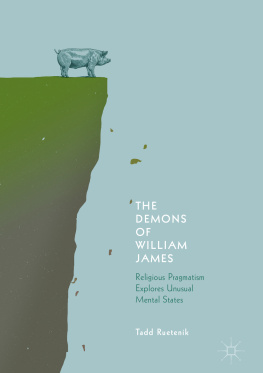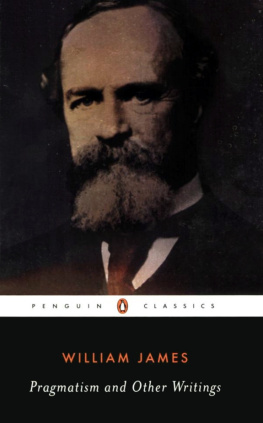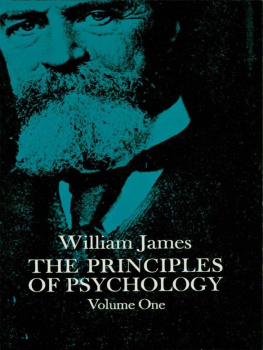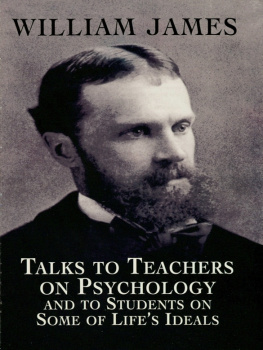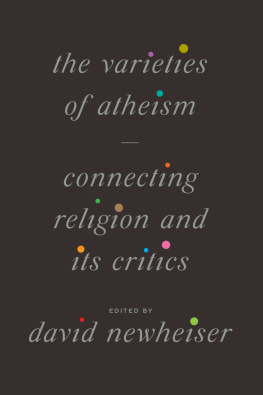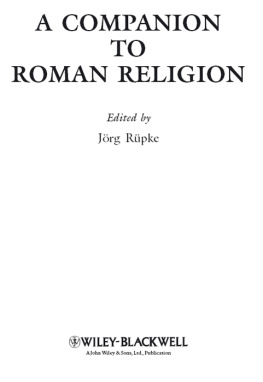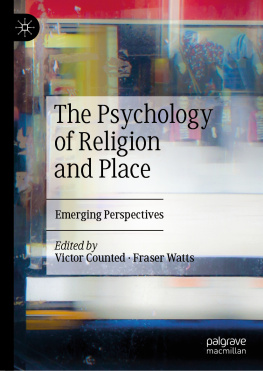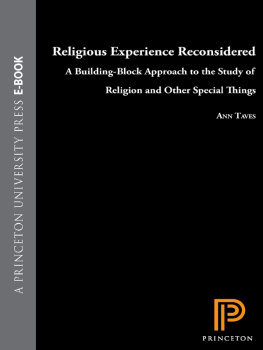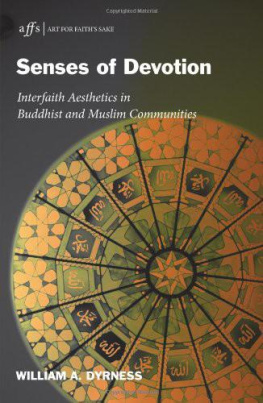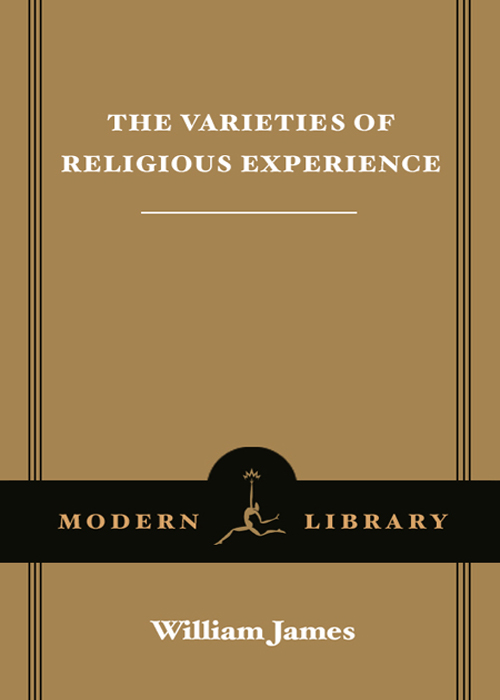T his book would never have been written had I not been honored with an appointment as Gifford Lecturer on Natural Religion at the University of Edinburgh. In casting about me for subjects of the two courses of ten lectures each for which I thus became responsible, it seemed to me that the first course might well be a descriptive one on Mans Religious Appetites, and the second a metaphysical one on Their Satisfaction through Philosophy. But the unexpected growth of the psychological matter as I came to write it out has resulted in the second subject being postponed entirely, and the description of mans religious constitution now fills the twenty lectures. In of the book. I hope to be able at some later day to express them in more explicit form.
In my belief that a large acquaintance with particulars often makes us wiser than the possession of abstract formulas, however deep, I have loaded the lectures with concrete examples, and I have chosen these among the extremer expressions of the religious temperament. To some readers I may consequently seem, before they get beyond the middle of the book, to offer a caricature of the subject. Such convulsions of piety, they will say, are not sane. If, however, they will have the patience to read to the end, I believe that this unfavorable impression will disappear; for I there combine the religious impulses with other principles of common sense which serve as correctives of exaggeration, and allow the individual reader to draw as moderate conclusions as he will.
My thanks for help in writing these lectures are due to Edwin D. Starbuck, of Stanford University, who made over to me his large collection of manuscript material; to Henry W. Rankin, of East Northfield, a friend unseen but proved, to whom I owe precious information; to Theodore Flournoy, of Geneva, to Canning Schiller of Oxford, and to my colleague Benjamin Rand, for documents; to my colleague Dickinson S. Miller, and to my friends, Thomas Wren Ward, of New York, and Wincenty Lutoslawski, late of Cracow, for important suggestions and advice. Finally, to conversations with the lamented Thomas Davidson and to the use of his books, at Glenmore, above Keene Valley, I owe more obligations than I can well express.
March, 1902.
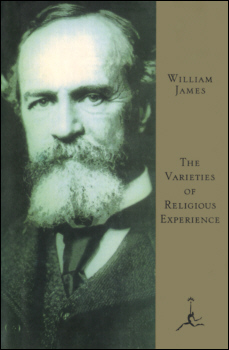
1994 Modern Library Edition
Biographical note copyright 1994 by Random House, Inc.
All rights reserved under International and Pan-American Copyright Conventions. Published in the United States by Random House, Inc., New York, and simultaneously in Canada by Random House of Canada Limited, Toronto.
Modern Library and colophon are registered trademarks of Random House, Inc.
Title page photograph courtesy of The Bettmann Archive
LIBRARY OF CONGRESS CATALOGING-IN-PUBLICATION DATA
James, William, 1842-1910.
The varieties of religious experience: a study in human nature/by
William James.1994 Modern Library ed.
p. cm.
"Being the Gifford lectures on natural religion delivered
at Edinburgh in 1901-1902."
Includes bibliographical references.
1. Experience (Religion). 2. Psychology, Religious. 3. Religion. 4. Conversion. 5. Philosophy and religion. I. Title. II. Title: Gifford lectures on natural religion.
BL53.J36 1994
291.4'2dc20 93-40461
Modern Library website address: www.modernlibrary.com
eISBN: 978-0-679-64158-2
v3.0
L E C T U R E XX
____________________
CONCLUSIONS
T he material of our study of human nature is now spread before us; and in this parting hour, set free from the duty of description, we can draw our theoretical and practical conclusions. In my first lecture, defending the empirical method, I foretold that whatever conclusions we might come to could be reached by spiritual judgments only, appreciations of the significance for life of religion, taken on the whole. Our conclusions cannot be as sharp as dogmatic conclusions would be, but I will formulate them, when the time comes, as sharply as I can.
Summing up in the broadest possible way the characteristics of the religious life, as we have found them, it includes the following beliefs:
1. That the visible world is part of a more spiritual universe from which it draws its chief significance;
2. That union or harmonious relation with that higher universe is our true end;
3. That prayer or inner communion with the spirit thereofbe that spirit God or lawis a process wherein work is really done, and spiritual energy flows in and produces effects, psychological or material, within the phenomenal world.
Religion includes also the following psychological characteristics:
4. A new zest which adds itself like a gift to life, and takes the form either of lyrical enchantment or of appeal to earnestness and heroism.
5. An assurance of safety and a temper of peace, and, in relation to others, a preponderance of loving affections.
In illustrating these characteristics by documents, we have been literally bathed in sentiment. In re-reading my manuscript, I am almost appalled at the amount of emotionality which I find in it. After so much of this, we can afford to be dryer and less sympathetic in the rest of the work that lies before us.
The sentimentality of many of my documents is a consequence of the fact that I sought them among the extravagances of the subject. If any of you are enemies of what our ancestors used to brand as enthusiasm, and are, nevertheless, still listening to me now, you have probably felt my selection to have been sometimes almost perverse, and have wished I might have stuck to soberer examples. I reply that I took these extremer examples as yielding the profounder information. To learn the secrets of any science, we go to expert specialists, even though they may be eccentric persons, and not to commonplace pupils. We combine what they tell us with the rest of our wisdom, and form our final judgment independently. Even so with religion. We who have pursued such radical expressions of it may now be sure that we know its secrets as authentically as anyone can know them who learns them from another; and we have next to answer, each of us for himself, the practical question: what are the dangers in this element of life? and in what proportion may it need to be restrained by other elements, to give the proper balance?
* * *
But this question suggests another one which I will answer immediately and get it out of the way, for it has more than once already vexed us. Ought it to be assumed that in all men the mixture of religion with other elements should be identical? Ought it, indeed, to be assumed that the lives of all men should show identical religious elements? In other words, is the existence of so many religious types and sects and creeds regrettable?
To these questions I answer No emphatically. And my reason is that I do not see how it is possible that creatures in such different positions and with such different powers as human individuals are, should have exactly the same functions and the same duties. No two of us have identical difficulties, nor should we be expected to work out identical solutions. Each, from his peculiar angle of observation, takes in a certain sphere of fact and trouble, which each must deal with in a unique manner. One of us must soften himself, another must harden himself; one must yield a point, another must stand firmin order the better to defend the position assigned him. If an Emerson were forced to be a Wesley, or a Moody forced to be a Whitman, the total human consciousness of the divine would suffer. The divine can mean no single quality, it must mean a group of qualities, by being champions of which in alternation, different men may all find worthy missions. Each attitude being a syllable in human natures total message, it takes the whole of us to spell the meaning out completely. So a god of battles must be allowed to be the god for one kind of person, a god of peace and heaven and home, the god for another. We must frankly recognize the fact that we live in partial systems, and that parts are not interchangeable in the spiritual life. If we are peevish and jealous, destruction of the self must be an element of our religion; why need it be one if we are good and sympathetic from the outset? If we are sick souls, we require a religion of deliverance; but why think so much of deliverance, if we are healthy-minded? Unquestionably, some men have the completer experience and the higher vocation, here just as in the social world; but for each man to stay in his own experience, whateer it be, and for others to tolerate him there, is surely best.


